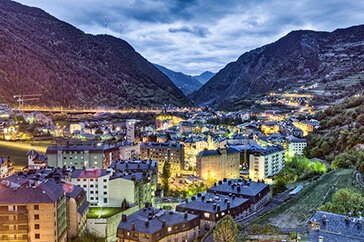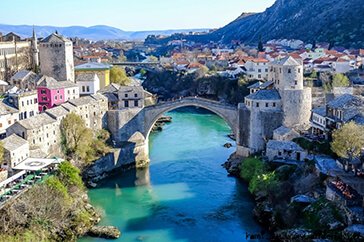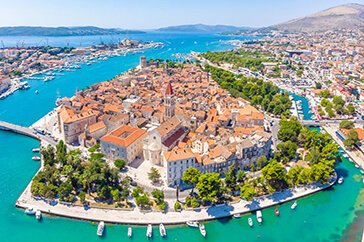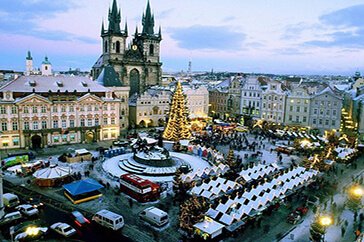Countries
We Provide List of Countries for Immigration

Albania
Albania, located in Southeastern Europe on the Balkan Peninsula, is a country known for its stunning coastline, mountainous landscapes, and rich history. With a population of around 2.8 million people, it is one of the smaller countries in Europe. The capital city of Albania is Tirana, a vibrant urban center known for its colorful buildings, bustling markets, and lively café culture. Albania's economy is transitioning from a centralized to a market-based system, with key sectors including agriculture, tourism, energy, manufacturing, and services. The country is known for its production of agricultural products such as olives, grapes, and citrus fruits, as well as its potential for hydroelectric power generation. Albania has a rich cultural heritage shaped by its history of Illyrian, Greek, Roman, Byzantine, and Ottoman influences, as well as its long-standing traditions of music, dance, and folklore. The country is home to numerous cultural landmarks, including ancient ruins, medieval castles, Ottoman mosques, and traditional villages, reflecting its diverse ethnic and historical heritage. Albanian culture is celebrated for its music, literature, cuisine, and traditional festivals such as Independence Day and Albanian Flag Day. Despite its natural beauty and cultural richness, Efforts to address these challenges and promote economic development, social welfare, and European integration are ongoing, with a focus on infrastructure development, rule of law, and environmental protection. Overall, Albania is a country of untapped potential, cultural diversity, and natural beauty, offering visitors a unique and unforgettable experience in the heart of the Balkans.


Andorra
Andorra, nestled in the eastern Pyrenees mountains between France and Spain, is a tiny principality known for its stunning mountain scenery, ski resorts, and tax haven status. With a population of around 77,000 people, it is one of the smallest countries in Europe. The capital city of Andorra is Andorra la Vella, a charming town known for its picturesque old quarter, boutique shops, and Romanesque churches. Andorra's economy is based largely on tourism, with skiing and hiking being major attractions, as well as duty-free shopping drawing visitors from neighboring countries. Andorra has a unique political structure as a parliamentary democracy headed by two co-princes: the President of France and the Bishop of Urgell in Spain. The country has a high standard of living and is known for its low taxes, attracting international businesses and wealthy individuals. Despite its small size, Andorra boasts a rich cultural heritage, with Catalan as its official language and a blend of Spanish, French, and Catalan influences in its cuisine, music, and festivals. Overall, Andorra offers visitors a serene mountain escape with outdoor recreational opportunities, tax-free shopping, and a glimpse into its unique blend of European cultures.


Austria
Austria, located in Central Europe, is a landlocked country known for its stunning Alpine landscapes, rich cultural heritage, and historic cities. With a population of around 9 million people, it is one of the smaller countries in Europe. The capital city of Austria is Vienna, known for its grand palaces, classical music heritage, and vibrant cultural scene. Other major cities include Salzburg, birthplace of Mozart and setting for "The Sound of Music," and Innsbruck, renowned for its winter sports. Austria's economy is highly developed, with key sectors including tourism, manufacturing, services, and technology. The country is known for its high standard of living, excellent healthcare, and quality education system. Austria has a rich cultural heritage shaped by its history of Habsburg rule, classical music composers such as Mozart and Beethoven, and architectural gems like Schönbrunn Palace and the Vienna State Opera. The country is known for its music festivals, classical concerts, and traditional folk culture. Despite its small size, Austria is a global leader in environmental sustainability, renewable energy, and social welfare. The country faces challenges such as demographic changes, integration of migrants, and balancing economic growth with environmental protection. Overall, Austria is a country of natural beauty, cultural richness, and high quality of life, offering visitors a blend of history, tradition, and modernity in the heart of Europe.


Belgium
Belgium, located in Western Europe, is a small yet culturally rich country known for its medieval towns, diverse cuisine, and headquarters of the European Union and NATO. With a population of around 11.5 million people, it is one of the most densely populated countries in Europe. The capital city of Belgium is Brussels, a cosmopolitan city known for its historic Grand Place, European Quarter, and Art Nouveau architecture. Other major cities include Antwerp, known for its diamond trade and fashion, and Bruges, famous for its well-preserved medieval architecture and canals. Belgium's economy is highly developed, with key sectors including manufacturing, services, finance, and tourism. The country is known for its chocolate, beer, waffles, and fries, as well as its production of machinery, chemicals, and automobiles. Belgium has a rich cultural heritage shaped by its history of Flemish and Walloon regions, as well as influences from neighboring France, Germany, and the Netherlands. The country is known for its art, music, literature, and festivals, such as the Carnival of Binche and the Gentse Feesten. Despite its small size, Belgium faces challenges such as political divisions between its Flemish and Walloon communities, as well as issues related to immigration, security, and environmental sustainability. Efforts to address these challenges and promote social cohesion, economic growth, and environmental protection are ongoing. Overall, Belgium is a country of historical significance, cultural diversity, and global influence, offering visitors a blend of old-world charm, modernity, and international diplomacy in the heart of Europe.


Bosnia and herzegovina
Bosnia and Herzegovina, located in southeastern Europe on the Balkan Peninsula, is a country known for its rich history, diverse culture, and stunning natural landscapes. With a population of around 3.5 million people, it is ethnically and religiously diverse. The capital city of Bosnia and Herzegovina is Sarajevo, known for its mix of Ottoman, Austro-Hungarian, and Yugoslav influences, as well as its tragic history during the Bosnian War of the 1990s. Other major cities include Banja Luka, Mostar, and Tuzla. Bosnia and Herzegovina's economy is transitioning from a socialist system to a market-oriented one, with key sectors including agriculture, industry, services, and tourism. The country is known for its natural beauty, including the Dinaric Alps, rivers, lakes, and historic towns. Bosnia and Herzegovina has a complex cultural heritage shaped by its history of Ottoman and Austro-Hungarian rule, as well as its multiethnic population comprising Bosniaks, Serbs, and Croats. The country is known for its diverse religious heritage, including Islam, Orthodox Christianity, and Catholicism, as well as its rich literature, music, and cuisine. Despite progress since the Bosnian War, Bosnia and Herzegovina faces challenges such as political divisions, economic stagnation, and ethnic tensions. Efforts to address these challenges and promote reconciliation, economic development, and European integration are ongoing. Overall, Bosnia and Herzegovina is a country of resilience, cultural richness, and natural beauty, offering visitors a blend of history, tradition, and scenic landscapes in the heart of the Balkans.


Bulgaria
Bulgaria, located in southeastern Europe on the Balkan Peninsula, is a country known for its rich history, diverse landscapes, and vibrant culture. With a population of around 7 million people, it is one of the oldest countries in Europe. The capital city of Bulgaria is Sofia, known for its mix of ancient and modern architecture, historic landmarks, and cultural institutions. Other major cities include Plovdiv, Varna, and Burgas. Bulgaria's economy is diverse, with key sectors including agriculture, manufacturing, services, and tourism. The country is known for its production of agricultural products such as grains, fruits, and vegetables, as well as its textile, machinery, and electronics industries. Bulgaria has a rich cultural heritage shaped by its history of Thracian, Greek, Roman, Byzantine, and Ottoman influences, as well as its Slavic roots. The country is known for its folk music, dance, and traditional crafts, as well as its Orthodox Christian religious traditions. Despite progress since the fall of communism, Bulgaria faces challenges such as corruption, political instability, and emigration. Efforts to address these challenges and promote economic development, social welfare, and European integration are ongoing. Overall, Bulgaria is a country of historical significance, natural beauty, and cultural richness, offering visitors a blend of ancient history, picturesque landscapes, and warm hospitality in the heart of the Balkans.


Croatia
Croatia, located in Southeast Europe on the Adriatic Sea, is a country known for its stunning coastline, historic cities, and rich cultural heritage. With a population of around 4 million people, it is one of the smaller countries in Europe. The capital city of Croatia is Zagreb, a lively cultural center known for its historic architecture, museums, and vibrant arts scene. Other major cities include Split, known for its ancient Roman ruins and beautiful beaches, and Dubrovnik, a UNESCO World Heritage site famous for its well-preserved medieval walls and picturesque old town. Croatia's economy is diversified, with key sectors including tourism, manufacturing, services, and agriculture. The country is known for its beautiful coastline, which attracts millions of visitors each year with its crystal-clear waters, secluded coves, and historic towns. Croatia has a rich cultural heritage shaped by its history of Roman, Byzantine, Venetian, and Ottoman influences, as well as its Slavic roots. The country is known for its music, dance, literature, and cuisine, as well as its traditional festivals such as the Dubrovnik Summer Festival and the Sinjska Alka. Despite its natural beauty and cultural richness, Croatia faces challenges such as unemployment, emigration, and political corruption. Efforts to address these challenges and promote economic development, social welfare, and European integration are ongoing. Overall, Croatia is a country of stunning landscapes, rich history, and warm hospitality, offering visitors a blend of natural beauty, cultural heritage, and Mediterranean charm on the shores of the Adriatic Sea.


Cyprus
Cyprus, located in the Eastern Mediterranean, is an island country known for its rich history, stunning beaches, and cultural heritage. With a population of around 1.2 million people, it is one of the smaller countries in the European Union. The capital city of Cyprus is Nicosia, the last divided capital in the world, split between the Greek Cypriot south and the Turkish Cypriot north. Other major cities include Limassol, Larnaca, and Paphos. Cyprus's economy is diverse, with key sectors including tourism, shipping, financial services, and agriculture. The country is known for its beautiful beaches, ancient ruins, and vibrant nightlife, making it a popular tourist destination. Cyprus has a rich cultural heritage shaped by its history of Greek, Roman, Byzantine, and Ottoman influences. The country is known for its Greek and Turkish Cypriot communities, languages, and traditions, as well as its cuisine, music, and festivals such as Kataklysmos and Easter. Despite its natural beauty and cultural richness, Cyprus faces challenges such as political division, economic inequality, and environmental degradation. Efforts to address these challenges and promote reconciliation, economic development, and environmental sustainability are ongoing. Overall, Cyprus is a country of contrasts, blending ancient history with modernity, cultural diversity with unity, and natural beauty with social challenges, making it a fascinating destination in the Eastern Mediterranean.


Czech republic
The Czech Republic, located in Central Europe, is a landlocked country known for its rich history, stunning architecture, and cultural heritage. With a population of around 10.7 million people, it is one of the smaller countries in Europe. The capital city of the Czech Republic is Prague, known for its picturesque old town, historic castles, and Gothic cathedrals. Other major cities include Brno, Ostrava, and Plzeň. The Czech Republic's economy is diverse, with key sectors including manufacturing, services, tourism, and technology. The country is known for its production of automobiles, machinery, beer, and glass, as well as its growing technology and innovation sectors. The Czech Republic has a rich cultural heritage shaped by its history of Bohemian and Moravian kingdoms, Austrian and Hungarian empires, and later Soviet influence. The country is known for its literature, music, art, and architecture, as well as its traditional festivals such as Easter and Christmas. Despite its economic success, the Czech Republic faces challenges such as corruption, political polarization, and demographic changes. Efforts to address these challenges and promote economic development, social welfare, and European integration are ongoing. Overall, the Czech Republic is a country of historical significance, cultural richness, and natural beauty, offering visitors a blend of medieval charm, vibrant culture, and modern amenities in the heart of Europe.


Denmark
Denmark, located in Northern Europe, is a small yet prosperous country known for its high standard of living, progressive social policies, and rich cultural heritage. With a population of around 5.8 million people, it is one of the most socially and economically developed countries in the world. The capital city of Denmark is Copenhagen, a vibrant city known for its historic landmarks such as the Tivoli Gardens, the Little Mermaid statue, and the colorful Nyhavn waterfront. Other major cities include Aarhus, Odense, and Aalborg. Denmark's economy is highly developed, with key sectors including manufacturing, services, renewable energy, and pharmaceuticals. The country is known for its innovative design, sustainable practices, and strong welfare state, with high levels of education, healthcare, and social security. Denmark has a rich cultural heritage shaped by its history of Viking settlements, medieval kingdoms, and modern democracy. The country is known for its literature, art, architecture, and design, as well as its traditional festivals such as Christmas and Midsummer. Despite its economic prosperity, Denmark faces challenges such as immigration integration, environmental sustainability, and aging population. Efforts to address these challenges and promote social cohesion, economic growth, and environmental protection are ongoing. Overall, Denmark is a country of innovation, creativity, and social equality, offering visitors a blend of history, culture, and modernity in a picturesque Scandinavian setting.


England
The United Kingdom (UK), located off the northwestern coast of mainland Europe, comprises four constituent countries: England, Scotland, Wales, and Northern Ireland. It is known for its rich history, diverse culture, and influential contributions to literature, science, and politics. The capital city of the United Kingdom is London, a global financial and cultural hub known for its iconic landmarks such as the Tower of London, Buckingham Palace, and the British Museum. Other major cities include Edinburgh, Cardiff, and Belfast, each with its own unique cultural identity. The United Kingdom's economy is one of the largest in the world, with key sectors including finance, manufacturing, services, technology, and creative industries. It is known for its innovation, research, and development, as well as its global reach through trade and investment. The UK has a rich cultural heritage shaped by its history of monarchy, empire, and parliamentary democracy. It is home to diverse ethnic communities, languages, and traditions, reflected in its cuisine, music, literature, and festivals. Despite its strengths, the UK faces challenges such as political divisions, social inequality, and the impact of Brexit on its relationship with Europe. Efforts to address these challenges and promote economic growth, social cohesion, and environmental sustainability are ongoing. Overall, the United Kingdom is a country of historical significance, cultural diversity, and global influence, offering visitors a blend of tradition and modernity in a dynamic and ever-changing landscape.


Estonia
Estonia, located in Northern Europe on the eastern coast of the Baltic Sea, is a small but technologically advanced country known for its digital society, picturesque landscapes, and rich cultural heritage. With a population of around 1.3 million people, it is one of the smallest countries in the European Union. The capital city of Estonia is Tallinn, a charming medieval town known for its well-preserved Old Town, historic landmarks, and vibrant cultural scene. Estonia's economy is highly developed, with key sectors including information technology, telecommunications, manufacturing, services, and tourism. The country is known for its innovative e-government services, startup ecosystem, and digital infrastructure. Estonia has a rich cultural heritage shaped by its history of Scandinavian, German, Russian, and Soviet influences, as well as its long-standing traditions of music, literature, and folklore. The country is home to numerous cultural landmarks, including medieval castles, Gothic churches, and Soviet-era monuments, reflecting its diverse ethnic and historical heritage. Estonian culture is celebrated for its music festivals, traditional folk dances, and cuisine. Despite its small size, Estonia has made significant progress since regaining independence in 1991, transitioning to a democratic republic and joining Western institutions such as NATO and the European Union. The country has implemented various reforms to promote economic development, social welfare, and technological innovation. Overall, Estonia is a country of innovation, natural beauty, and cultural richness, offering visitors a unique and dynamic experience in the Baltic region.
